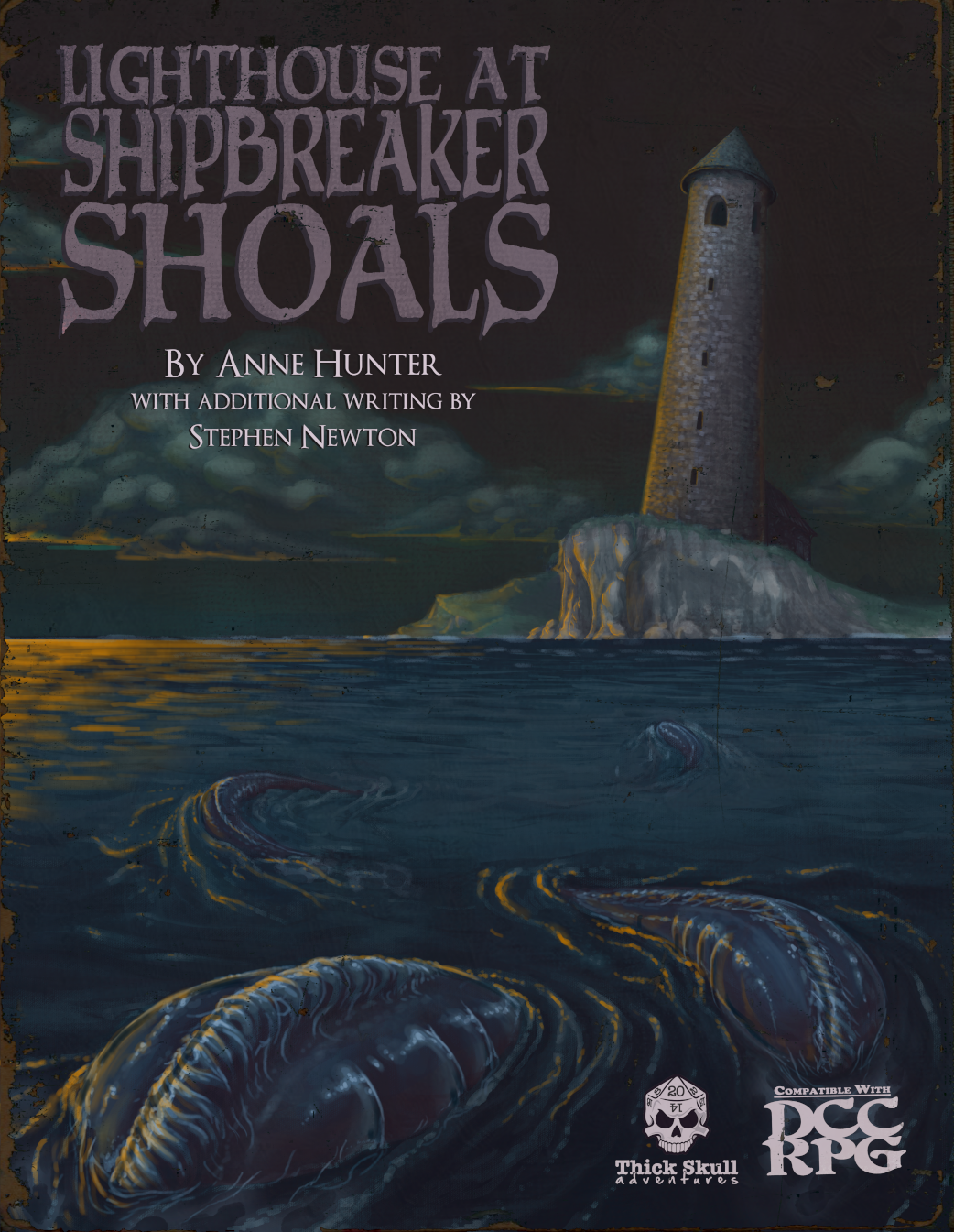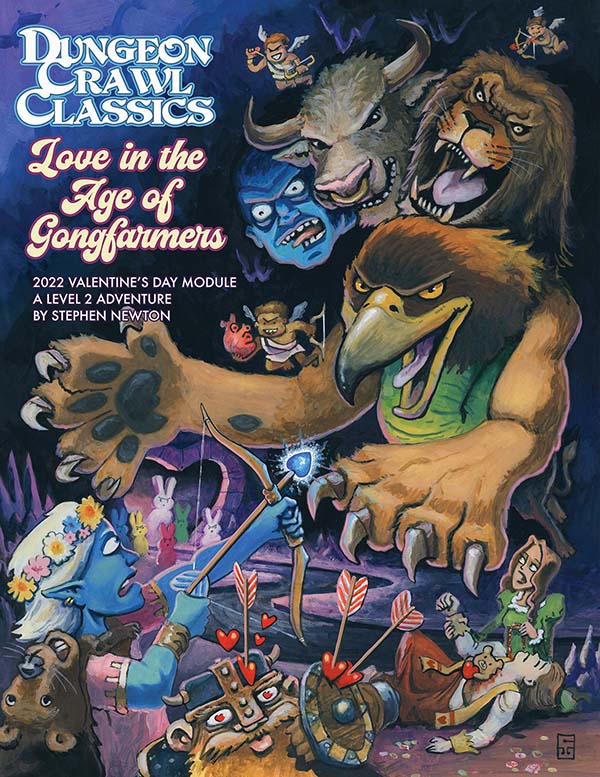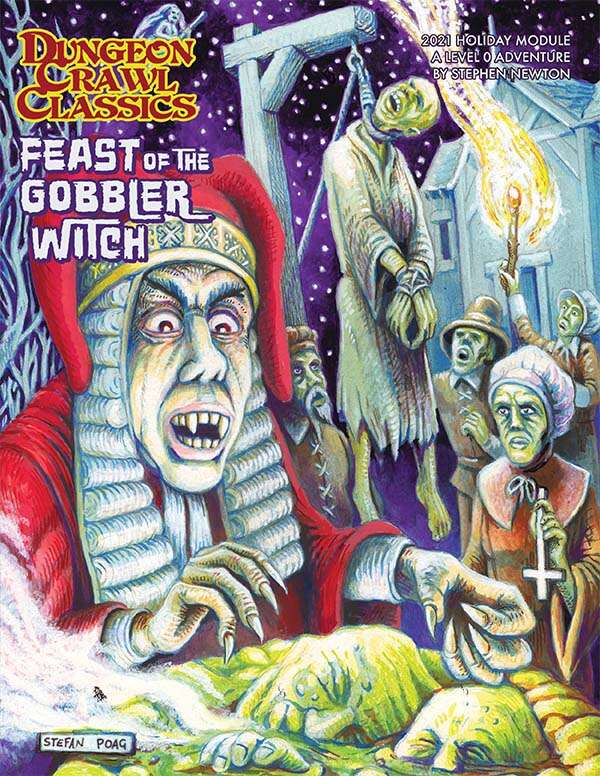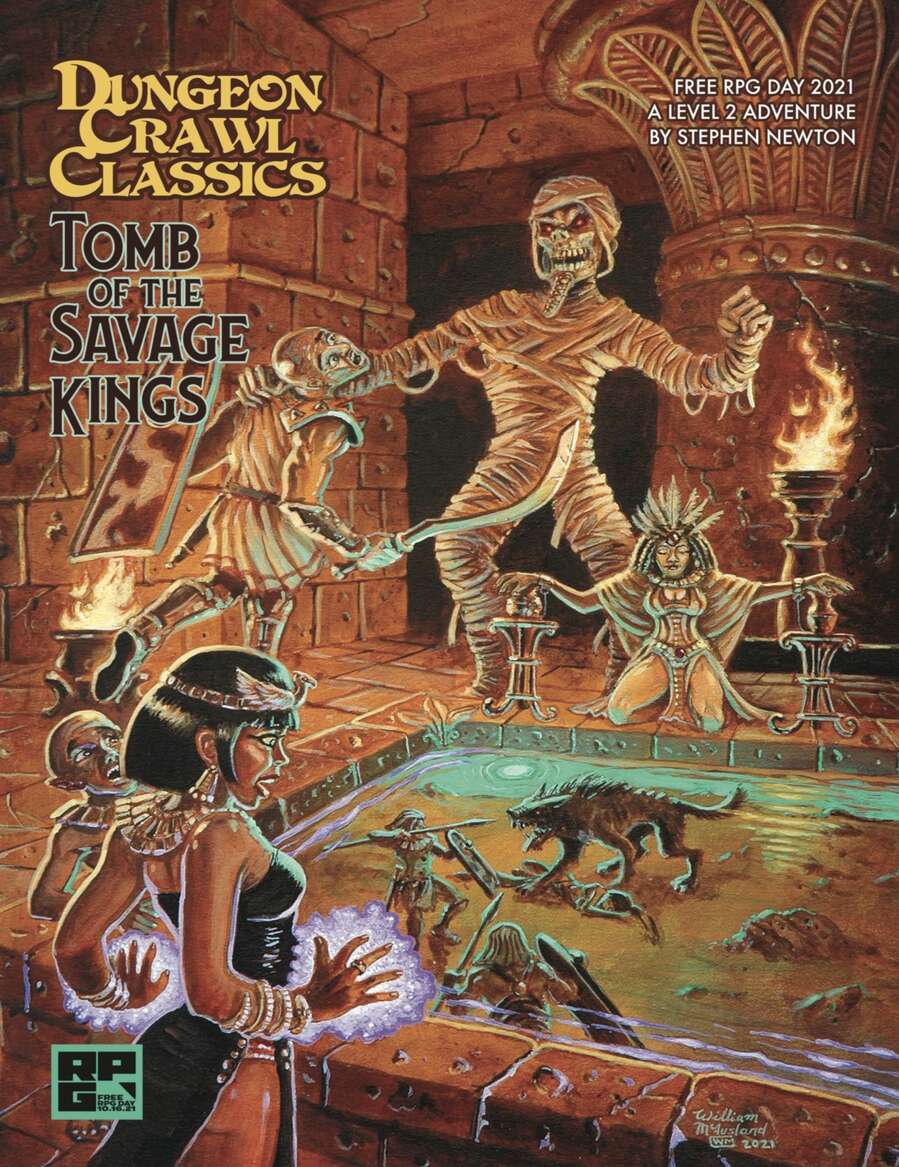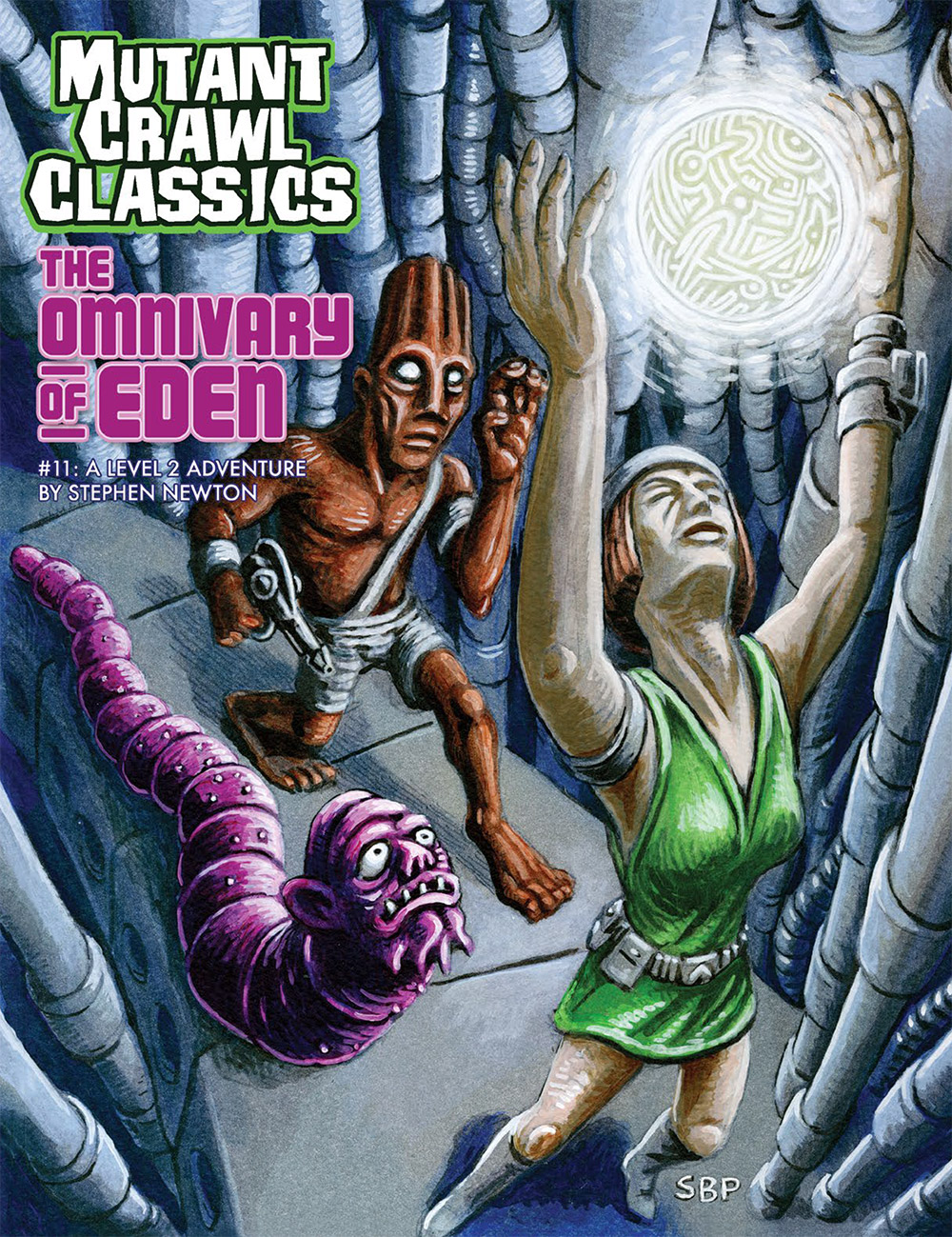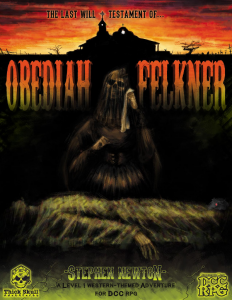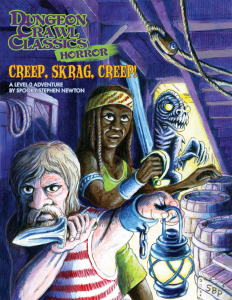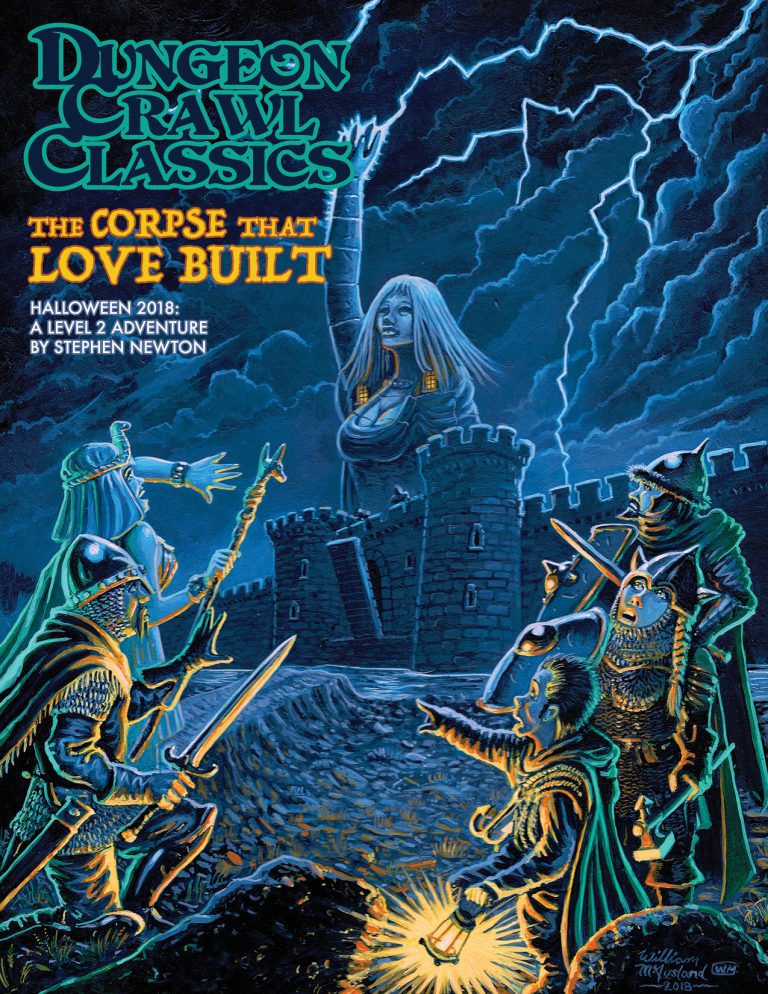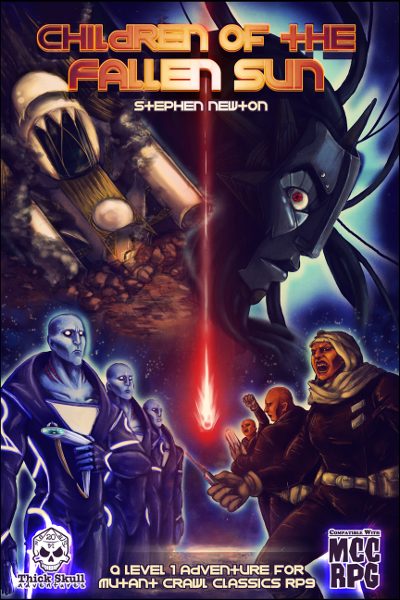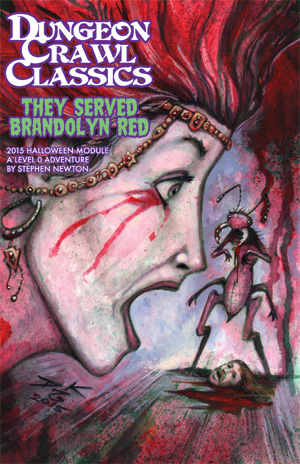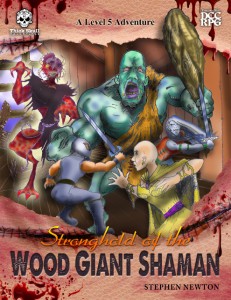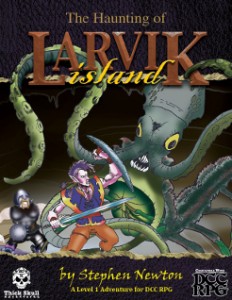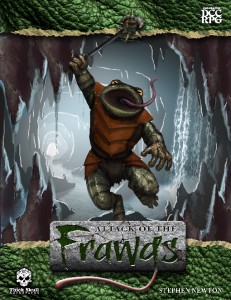Goodman Game’s Dungeon Crawl Classics RPG Beta has arrived.
Gentle readers, before I go much further let me come clean on two points:
I’ve been playing D&D for a long time, but the bulk of that role-playing happened using AD&D rules. I mostly leapfrogged 3rd Edition altogether going (more or less) straight from AD&D and 2ED until a few years ago when I took up 4ED.
In those later years, I became a fan Goodman Game’s DCC modules. IMHO, they are this generations Judges Guild, and by that I mean premiere adventures created outside of the walls of WotC. So when Goodman Games announced they were coming out with their own RPG, I was immediately interested and excited. These guys love gaming, and I love their products.
As fate would have it, the release of the beta rules last week coincided with a business trip I had to take allowing me to read the rules on the plane and take notes while I read. I suppose I should now offer one additional disclaimer: I have not actually yet played DCC RPG. I have only read the beta rules, so my impressions are just that: impressions from reading rules without playing them. I fully encourage anyone wanting more details to pickup the beta rules themselves or get active on the forums dedicated to the game.
So who might find the rest of this interesting? I suppose anyone who has an understanding of the traditional AD&D rules (and/or 4ED rules) and might be curious how DCC is different from either of those games.
And perhaps one last disclaimer before getting to the meat: these thoughts on the beta rules as downloaded on June 11, 2011. The final rules could be very different. So again to be clear, these are observations and not a review per se, because I have not played the game. Hopefully this will be interesting for a few folks looking for a quick rundown on some differences.
My High Level Summary
In my opinion, the rules are closer to the “simplicity” of AD&D than 3ED or 4ED, and yet, you can see how those latter games had some influence in the design. In my opinion, the most noteworthy differences are in the tone of the game, specifically on the attitude toward magic. The following passage leads up the magic section:
Summoning magical energies is arduous, expensive, and dangerous. No wizard does it lightly. As a result, there are no mundane magicks, no spells used simply to light a corridor, for example. Use a torch, fool; it is much safer.
Later descriptions about how wizards enter bonds with patron spirits which deliver benefits to the wizards who offers sacrifices of blood or gold (called Spellburn) and how as the wizard continues to use more powerful magic, and more frequently, the risk of their physical body transforming via magical corruption from spell failure and other activities really puts a darker more mature element into how magic is portrayed in the game. This is not Harry Potter & Muggles magic, this is Conan and Elric and Dark Shadows.
The second thing that strikes me in the character creation process. Essentially all characters start at 0 level (-100 XP) and need to work their way up to 1st level. PCs are encouraged to bring 2-4 PCs into those early games as many won’t survive. Indeed, there are other places where characters can permanently lose stat points. I have to imagine that a 6th level player in DCC RPG would be one grizzled veteran indeed.
More General Thoughts:
- Funky dice. The game uses some new-funky dice (d3, d14, etc.) While I personally don’t own any of these funky dice shapes, there are guidelines on how to use old-funky dice (d4, d12, d20, etc.). I say “old-funky” dice because my Yahtzee playing wife calls my d8, d12, funky compared to what she’s used to playing with. It’s all about perspective.
- After reading other games, the rules are refreshingly brief
- One of the biggest Hmmmm moments I’ve had has been how classes and races are now one: the classes are now: Warrior, Thief, Wizard, Cleric, Elf, Dwarf, Halfling. But I suppose in hindsight, just how many people ever played a dwarf magic user? There are minor bonus abilities associated to the “Race Classes”. In other parts of the text its mentioned that approximately 75% of the armor found in a dungeon will be Human so I think it might be safe to assume that 75% of the folks in this campaign are also human.
- It looks like halflings will be suited to those who prefer two handed fighting
- One of the character traits is “Luck” which seems to have replaced Wisdom modifiers for Clerics, but also has its own unique modifiers for other situations as well. I believe introducing the Luck element will add some interesting color to games.
- The combat rules allow for some more permanent damage. Scars, broken bones, etc.
- Several situations exist where characters can permanently lose ability scores. I have the feeling that DCC characters are going to have shorter life spans
- Magic has become more “mysterious” and I would daresay a bit darker, again reflecting a mature game
- Generally speaking, there has been a lot design work added to effectively increase randomness in the world (luck, advancing attack die, corruption, etc.)
Random Thoughts on Concepts:
The following are just notes that I took down as I read sequentially through the beta rules so they go in order as they appear in the beta. Again, not a full description of rules, but some highlights that I found interesting. I would urge anyone interested to take a look through the full rule set.
Clerics
- Spell fatigue: interesting concept where with each additional spell cast that day uses exertion which could affect the outcome of subsequent spells.
- lso see that clerics can offer sacrifices to increase success probability. Very cool.
- Clerics do not have a heal spell, but can perform laying in hands.
- Titles per level are back (acolyte, adept, etc.) nice touch.
Thieves
- The thieves can’t language is back.
- Specific thief spells similar to 1st edition with a few new ones added (eg forge document). One interesting difference is that there are different values based on alignment. Not sure what the thinking was there but I suppose that I will find FHA tics are better at backstabbing and lawfuls are better at forgery, etc
- Interesting use of luck points, still need to get a handle on how this will work in gameplay. Thieves can burn a luck point to increase chance of success on a die roll.
Warriors
- Warriors get advancing attack die as opposed to level bonus (e.g. at first level they roll 1d3 and apply before their standard attack die 1d20) This should prove interesting to add some colorful randomness to melee.
- Mighty deeds of arms. The dramatic flair of combat similar to called shots of old. These can also perform things like push, trip, jump, etc. This is obviously going to be a colorful part of the warrior and the author provides many real game examples of how play testers have created interesting deeds. In short, dramatic action with simplified rule guidelines.
Wizards
- Weapons proficiencies similar to 1ed but includes shortswords and short bows.
- Ability to invoke patron for the most dire circumstances but with the significant cost of an ability point
Dwarf
- Ok, this is the first of the “race as a class”, should be interesting.
- Mostly similar to a warrior in stats, they can also perform the mighty deeds as described previously but also “sword and board” wherein the dwarf can perform a second bash attack with their shield.
- Underground skills similar to AD&D
- Their love of gold and gems allows dwarfs to actually smell them out!
Elf
- Elves live for thousands of years and have the same, if not more powerful, magical abilities of humans. They also will have the ability to summon theirr otherworldly entities much more frequently
- They also seem to be more multi class capable of wizard and warrior
Halfling
- Friendly family oriented farmer types. I can see Pip and Sam now.
- Naturally capable with multiple weapons, lots of natural bonuses there
- Naturally lucky, with bonuses to luck rolls
Skill check: Short and sweet. 5 is easy, 15 heroic, 20 to have poems written about you. General guidelines given for which abilities provide a bonus. Character backgrounds must be considered.
Equipment: Has the basics. Again more emphasis is focused on the players humble (read poor) beginnings. I haven’t rolled the dice yet but I suspect most adventurers will carry little more than a pitchfork and some rope.
Combat. From the rules:
Combat does not require a battle map or grid or miniatures. If you find these game aids helpful, by all means use them; however, the rules are written on the assumption that miniatures are optional.
Another fine quote:
Character death is frequent and merciless in the Dungeon Crawl Classics Role Playing Game, so the rules encourage each player to run more than one character at low levels.
Critical hits and fumble tables are provided to add some effects on these rolls
Might Deeds of Arms (more info): These will be cool to play. Goes through the seven general types of deeds with guidelines on how to GM (blinding shots, disarming shots, etc.) these are actually similar to the 4e rules of charging, tripping, etc.
damage and death: 0 hit points equal dead at first level. At higher levels you one round per level to bleed out and can be healed during that time, but will forever lose one stamina and carry a wicked scar
Morale saves: This an interesting mechanic where monsters/NPCs will jot fight to the death but flee. The mechanics are close to a will save with a few modifiers. It makes sense.
Two weapon fighting: With sufficient agility players can perform two weapon fighting typically with lower dice. Ex 1d16 in primary hand and 1d14 in off hand.
Falling damage: Falling causes 1d6 damage per ten feet but even more interesting is on a roll of 6 the character also breaks a bone! Sweet.
Spell duals: one of the largest blocks of rules deals with when wizards go mano y mano via a spell dual. Wizard face off with spells and counterspells with advantage going to the wizard who get’s a bit of momentum. I’m having visions of the finale of Willow. There’s also some really heinous effects if the magic crosses-streams Ghostbuster’s style.
Spell burn: Blood sacrifice will increase your spell chances! Nice. in addition it allows allows wizard to burn life force to cast spells they had otherwise lost for the day
Mercurial magic. Because of the unpredictability of magic and influences of wizard origins, magic spells will work differently wizard to wizard.
Magical corruption: Failing magic can transform your body. Rotting flesh, head of a snake, etc. They are not kidding when they say magic is dangerous.
Spells: the DCC beta is limited to first level spells and many of them will be familiar to the 1ed player. The biggest difference is in the use of spell points where 1-11 typically means spell failure and higher results indicate more potent effects. One of the more interesting spells is Invoke Patron/Patron Bond.
Invoke Patron/Patron Bond spell and concept: Much of the wizard magic is granted through a patron (demon, ghost. e
Patron Taint: The long term effects of a wizard frequently interacting with his non-mortal patron, whereas the wizard will eventually start manifesting behaviors and characteristics of that patron.
Readers, I’m excited to play this game and will be providing more thoughts as I get my local group together for some beta testing.

